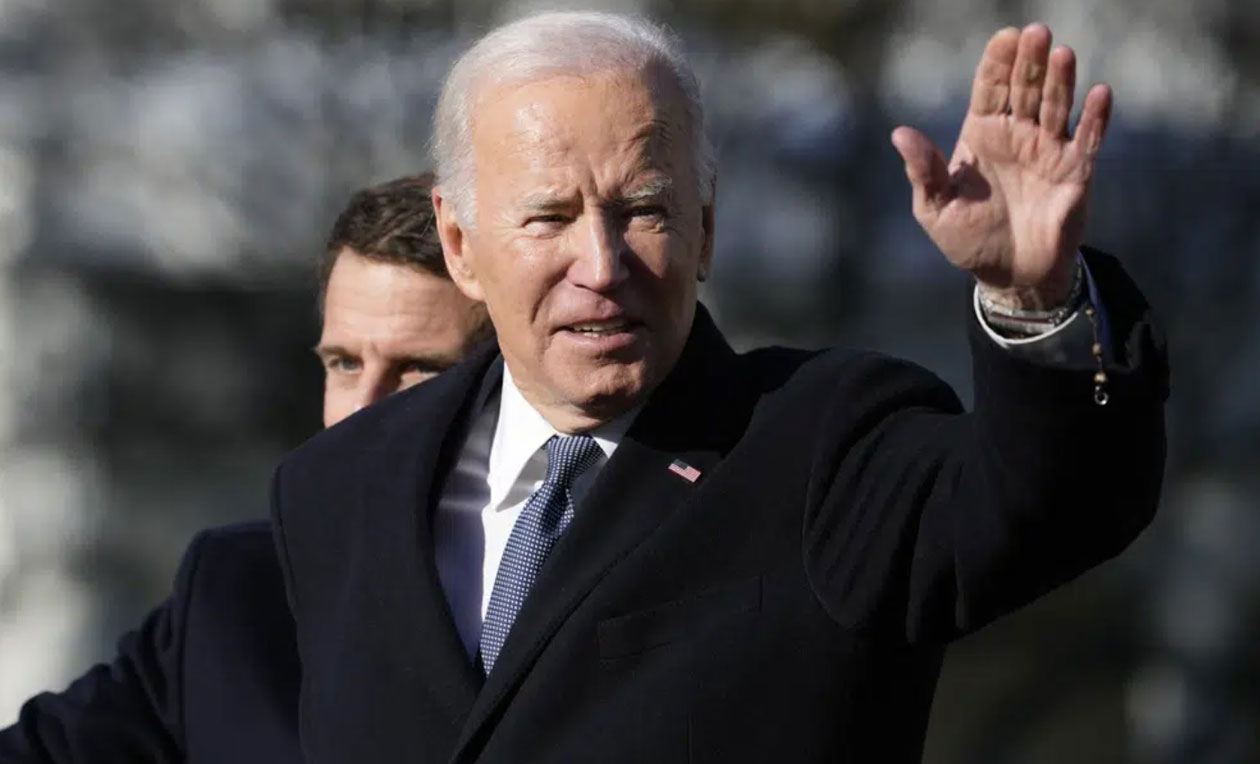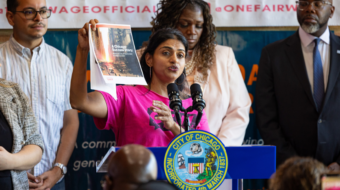
WASHINGTON—Giving in to pressure from Democratic President Joe Biden and corporate rail bosses, the Senate overwhelmingly imposed a four-year contract on 115,000 unionized freight railroad workers—without the seven paid sick days they sought. The contract, which a Biden board crafted, came in legislation the president signed this morning.
Biden, in a speech this morning at his signing of the bill, tried to deflect from anger expressed by workers and their unions by emphasizing that the workers are getting a 24 percent wage increase and that the whole issue of paid sick leave will be considered later, and for everyone, not just the rail workers. But that response, and the failure to insert the sick days into the contract, left workers and union leaders irate.
“Rail companies could do the right thing today and grant workers paid sick leave,” AFL-CIO President Liz Shuler said just before the Senate’s rejection of paid sick leave.
They refused, putting profits first
“But they’ve refused, putting profits over people. That’s how we got here. Regardless of what happens… the fight for paid sick leave won’t end. Calling workers ‘essential’ one minute and treating them as dispensable the next is abhorrent.
“We join rail workers—and all America’s workers—in securing paid sick leave, fair scheduling, and the dignity and respect they deserve.”
That respect and dignity include, though Shuler didn’t say so, respect and dignity for collective bargaining agreements—something both Congress and Biden disregarded in wrangling over this rail pact. Railroad Workers United, a rank-and-file organization representing all rail crafts, called them on it.
Since “a majority of rank-and-file union members have declared” the pact unsatisfactory, President Biden and Congress are overriding the democratically expressed will of railroad workers,” it declared. “While the tentative agreement provides significant wage increases, workers stated clearly and repeatedly their fight is not just about money. Railroad workers are fighting for the right to live—and have a life—outside of work (their emphasis).
To short-circuit the collective bargaining rights of the workers, the companies, Congress, and President Biden took advantage of U.S. law which allows Congress to act when national commerce is threatened. Both the companies and the administration held the threat of impending economic doom over the heads of Congress if the original deal without the sick days added by the House was not immediately approved yesterday.
“We are disappointed any time contract negotiations are taken out of the hands of the workers,” said Greg Regan, the president of the AFL-CIO’s Transportation Trades Council. “This was the plan of the railroads from the beginning. They knew from the very start that the issue of sick days was considered crucial by the rail workers. They never, from the very beginning, listened to what they knew the workers were demanding and needed.”
He said, however, that the fight for sick days would continue nevertheless during the length of this contract or at the end of it and that the fight for paid sick leave for all workers was something Biden has promised his administration will wage. Regan said he believed the Biden administration was honest about its promise to wage this fight.
He noted that the contract does include a large wage increase and that “were it not for the Biden administration we would still be nowhere at all with this struggle.”
The Brotherhood of Maintenance Employees, this morning, condemned everyone in Congress who voted against the sick days. “None of these lawmakers are worthy of being in Congress,” the union said in a statement.
The Smart Transportation Division, one of the three largest unions among the 12 the pact covers, issued a statement saying, “The freight rail industry is structured as a non-competitive oligopoly dominated by seven rail carriers and operates at the behest of Wall Street, prioritizing the maximization of profit for rail executives and shareholders, even if it comes at the expense of endangering the broader public and irreparably damaging the supply chain.
“Unfortunately, threats to the economy have caused this Congress to believe that a strike aversion is the best course for this nation,” the statement said. “We implore” politicians, the union said as the Senate was selling out the workers, “to not allow political pursuits or efforts to result in a scenario where we are forced to accept less than what is currently on the table…Our members want and need sick leave, but even more so, they need relief from the damning effects of operational changes made by the railroads over the last five years.”
Fight not over
“This fight is not over,” Regan’s AFL-CIO Transportation Trades Department tweeted just as paid sick leave went down the drain in the Senate.
“The full might of America’s transportation labor movement will move this fight forward. Workers are united on this issue. We are millions strong. We will continue to pursue rail worker sick leave through every avenue available to us. And we will win,” TTD vowed.
Biden argued lawmakers had to OK the contract now to prevent a forced strike by the workers starting a minute after midnight on Dec. 9, when a mandated “cooling-off period” expired. Without it, he warned, echoing corporate claims, much of U.S. commerce would halt, and the U.S. economy would take a big financial hit.
The House previously passed both the main deal and the seven days paid sick leave, which was the key, but not sole, hang-up that forced the administration to intervene in stalled rail talks earlier this year and work out the overall deal.
What neither Biden nor deal backers admitted is that working conditions, and especially onerous work rules with no paid sick leave—not even for doctors’ appointments—were the main conflict between the 12 rail unions and their members on one side and the big freight railroads on the other.
The railroads adamantly refused to even discuss paid sick leave, much less negotiate about it. And Biden, pleading the economic impact, pushed Congress, for the first time in decades, into overriding a collective bargaining agreement—one that four of the 12 unions had also rejected.
“Even as the need for worker protections and workplace flexibility have grown, railroad companies provide zero days of paid sick leave to their workers…If a rail worker comes down with COVID, the flu, or some other illness and calls in sick, that worker will not only receive no pay, but will be penalized and, in some cases, fired. That is absolutely unacceptable,” Sen. Bernie Sanders, Ind.-Vt., and 11 other senators said the day before the Senate killed the paid sick leave,
But half of them voted for the final deal anyway. It passed 80-15.
“People in this country are kind of disgusted with the selfishness and corporate greed we are seeing,” Sanders told his colleagues, after disclosing that the freight rail firms made a record-breaking $1.2 billion in profits in the first nine months of 2022. “Guaranteeing seven paid sick days to rail workers would only cost the industry $321 million a year—less than 2%” of that.
“Please do not tell us the rail industry cannot afford to guarantee paid sick days to their workers.
“What the freight rail industry is saying to its workers is this: ‘It doesn’t matter if you have COVID. It doesn’t matter if you are lying in a hospital bed because of a medical emergency. It doesn’t matter if your wife has just given birth. It just doesn’t matter. If you do not come to work, no matter what the reason, we have the right to punish you; we have the right to fire you.’”
The 52-43 vote for the seven days of paid sick leave was somewhat bipartisan, but it fell short of the 60 votes needed to pass the separate measure and send it to Biden’s desk. Republican Sens. Ted Cruz (Texas), Josh Hawley (Mo.), Marco Rubio (Fla.), and Lindsey Graham (S.C.) broke party lines and voted for the paid sick leave while Democrat Joe Manchin of West Virginia voted against it. Three Democrats and two Republicans were absent.











